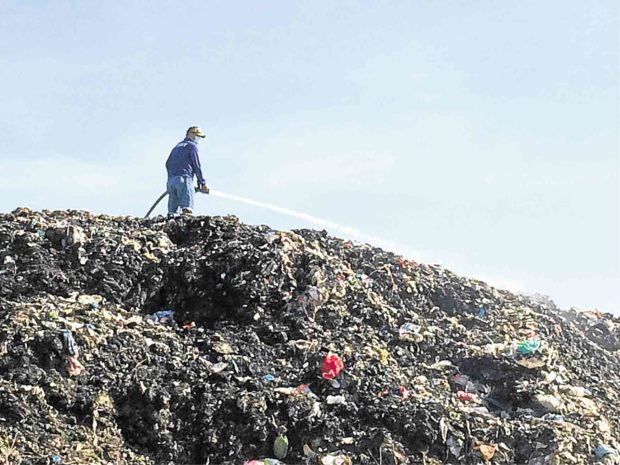P550-M recycling plant offers solution to garbage woes

The Dagupan dump was ordered closed in January following a fire there, disrupting the waste management system of the city. —YOLANDA SOTELO
DAGUPAN CITY—This city intends to convert its waste into reusable commodities like biogas (methane) and diesel fuel, resolving a garbage crisis which has festered since January when the local government was ordered to decommission its only dump.
The city government on Thursday signed a joint venture agreement with the SURE Global Waste to Worth Innovations (W2WI) Philippines, making it the third city to pilot a Waste to Worth (W2W) project, an undertaking of Proctor and Gamble Philippines.
Dagupan produces 30 tons of garbage daily and the estimated processed output from the deal would be 4,000 liters of diesel from plastics and 6,000 kg of methane from food wastes.
The city struggled with a waste management problem after the Department of Environment and Natural Resources ordered Dagupan to close its 3-hectare landfill at Tondaligan beach in Barangay Bonuan Gueset following a fire there that raged for days.
Mayor Belen Fernandez had described the landfill as “a decaying wound, festered with flies, emitting noxious fumes, seeping with hazardous fluids that flow directly into the open sea we hold sacred since we founded the great city.”
The dump, she said, “was slowly choking our people to death.”
“The great promise of waste to energy technology [was] the most viable solution we can ever come close to in addressing our city’s monstrous waste, something which evaded many city administrations for the last 50 years,” she said.
Jill Boughton, SURE Global W2WI president and chief executive officer, said some 40,000 tons of trash had accumulated at the dump, 39 percent of which was composed of food wastes and 25 percent plastic. The rest were residuals like shoes which, she said, would be brought to another facility for processing.
Boughton said plastics would be converted into methane gas and diesel through a process that would not pollute the environment. The food wastes would also be converted into methane gas.
According to her, the W2WI plant, which cost P550 million, would be given to Dagupan on a property to be provided by the city government.
She said it would take about a year before the plant was established and operational.
The W2W project was “focused on developing an integrated profitable and replicable waste management business model that extracts value from waste,” she said. —YOLANDA SOTELO